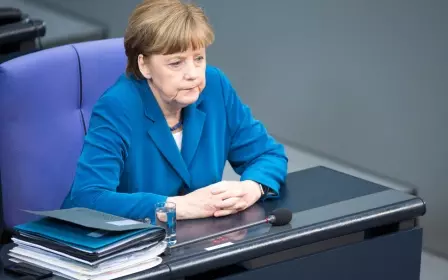Palestinian teen who cried before Merkel gets residency permit

BERLIN - A Palestinian teen threatened with deportation who burst into tears during a televised debate with German Chancellor Angela Merkel has got a residency permit for "humanitarian reasons," a statement said Friday.
In the encounter last month, 14-year-old Reem told Merkel in fluent German that she and her family, who arrived in the north German city of Rostock from a Lebanese refugee camp four years ago, faced possible deportation.
Merkel expressed sympathy before defending her government's asylum policies, saying Germany "couldn't manage" to shoulder the burden of all those fleeing war and poverty.
Minutes later, Reem began to weep and the chancellor stroked her head and tried to comfort her in a way critics said appeared awkward and cold, and which led to a storm of protest on social media.
The Rostock City Hall said in a statement that Reem and her family "had today received for the first time residency permits for humanitarian reasons".
"These permits are valid until March 2016," it said.
Chris Mueller, the Rostock mayor's deputy, said: "Reem is an example of successful integration in our city."
Europe's deepening crisis and its mounting human cost has sparked sharp divisions within the 28-nation European Union, with Germany leading efforts to get the bloc to accept more refugees while newer eastern states balk at the prospect of compulsory quotas.
Stay informed with MEE's newsletters
Sign up to get the latest alerts, insights and analysis, starting with Turkey Unpacked
Middle East Eye delivers independent and unrivalled coverage and analysis of the Middle East, North Africa and beyond. To learn more about republishing this content and the associated fees, please fill out this form. More about MEE can be found here.




